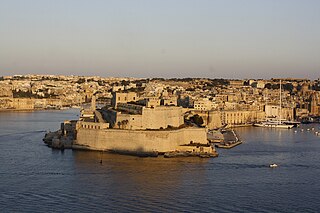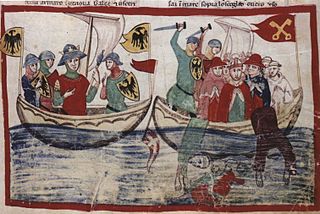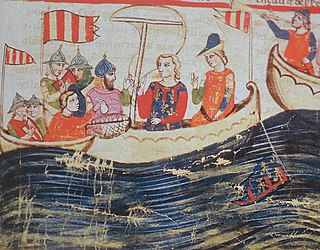
Year 1284 (MCCLXXXIV) was a leap year starting on Saturday of the Julian calendar.

The Battle of Malta took place on 8 July 1283 in the entrance to the Grand Harbour, the principal harbour of Malta, as part of the War of the Sicilian Vespers. An Aragonese fleet of galleys, commanded by Roger of Lauria, attacked and defeated a fleet of Angevin galleys commanded by Guillaume Cornut and Bartholomé Bonvin.

Roger of Lauria (c. 1245 – 17 January 1305), was a Calabrian knight who served the Crown of Aragon as admiral of the Aragonese navy during the War of the Sicilian Vespers. He was probably the most successful and talented naval tactician of the Middle Ages. He is known as Ruggero or Ruggiero di Lauria in Italian and Roger de Llúria in Catalan.

The naval Battle of Giglio was a military clash between a fleet of the Holy Roman Emperor Frederick II and a fleet of the Republic of Genoa in the Tyrrhenian Sea. It took place on Friday, May 3, 1241 between the islands of Montecristo and Giglio in the Tuscan Archipelago and ended with the victory of the Imperial fleet.

The Battle of the Gulf of Naples was a naval engagement during the War of the Sicilian Vespers. Fought on 5 June 1284 in the south of the Gulf of Naples, the battle saw a Aragonese–Sicilian fleet commanded by Roger of Lauria defeat a Angevin fleet commanded by Prince Charles of Salerno. Charles was captured during the battle, and the Aragonese victory helped secure Aragonese control of the sea around Sicily.
The naval Battle of Les Formigues (Catalan) took place probably in the early morning of 4 September 1285 near Les Formigues Islands, Catalonia, about 85 km northeast of Barcelona, when a Catalan-Sicilian galley fleet commanded by Roger of Lauria defeated a French and Genoese galley fleet commanded by Guilhem de Lodeva, Henry di Mari, and John de Orrea.

The Battle of the Counts was a naval engagement during the War of the Sicilian Vespers. Fought on 23 June 1287 between the fleets of Aragon-Sicily and Angevin Naples, the battle was a major victory for the Aragonese fleet and its commander, Roger of Lauria.
The naval Battle of Cape Orlando took place on 4 July 1299 at St Marco di Val Demone, north-western Sicily, when an Aragonese and Angevin galley fleet commanded by Roger of Lauria defeated a Sicilian galley fleet commanded by Conrad d'Oria. King James II of Aragon and Frederick III of Sicily were present with their fleets at the battle. The larger Aragonese–Angevin fleet was trapped on a lee shore but was able to win the battle with the intervention of its six-galley reserve that attacked the rear of the Sicilian fleet. The Sicilians fled when the flagship, with Frederick aboard, pulled back after the king collapsed from heat and exhaustion. Eighteen Sicilian vessels were captured and their crews massacred. The battle allowed for the invasion of Sicily but James, breaking with his Angevin allies, withdrew his force to Aragon and Frederick was able to defeat the Angevin army on land and secure the independence of Sicily in the Peace of Caltabellotta.

The War of the Sicilian Vespers, also shortened to the War of the Vespers, was a conflict waged by several medieval European kingdoms over control of Sicily from 1282 to 1302. The war, which started with the revolt of the Sicilian Vespers, was fought over competing dynastic claims to the throne of Sicily and grew to involve the Crown of Aragon, Angevin Kingdom of Naples, Kingdom of France, and the papacy.
Kurtoğlu Muslihiddin Reis was the admiral of the Ottoman Empire, as well as the Sanjak Bey of Rhodes. He played an important role in the Ottoman conquests of Egypt (1517) and Rhodes (1522) during which he commanded the Ottoman naval forces. He also helped establish the Ottoman Indian Ocean Fleet based in Suez, which was later commanded by his son, Kurtoğlu Hızır Reis.

The Battle of Ponza (1552) was a naval battle that occurred near the Italian island of Ponza. The battle was fought between a Franco-Ottoman fleet under Dragut and a Genoese fleet commanded by Andrea Doria. The Genoese were defeated and lost seven galleys captured. The battle made it easier for the Ottoman fleet to raid the coasts of Sicily, Sardinia, and Italy for the next three years.

The naval battle of Ponza was fought in early August 1435, when the Duke of Milan dispatched the Genoese navy to relieve the besieged town of Gaeta, which was currently under threat from the King of Aragon.
An incomplete list of events in 1299 in Italy:
Events which occurred in Italy or Italian territory in 1300:

Dragut was an Ottoman corsair, naval commander, governor, and noble. Under his command, the Ottoman Empire's maritime power was extended across North Africa. Recognized for his military genius, and as being among "the most dangerous" of corsairs, Dragut has been referred to as "the greatest pirate warrior of all time", "undoubtedly the most able of all the Turkish leaders", and "the uncrowned king of the Mediterranean". He was nicknamed "the Drawn Sword of Islam". He was described by a French admiral as "a living chart of the Mediterranean, skillful enough on land to be compared to the finest generals of the time" and that "no one was more worthy than he to bear the name of king". Hayreddin Barbarossa, who was his mentor, stated that Dragut was ahead of him "both in fishing and bravery".

The Battle of Capo d'Orso, sometimes known as the Battle of Cava and the Battle of Amalfi, was a naval engagement taking place over two days, on April 28 and April 29, 1528, during the War of the League of Cognac. A French fleet inflicted a crushing defeat on the fleet of the Kingdom of Naples under Spanish command in the Gulf of Salerno, where Spanish forces trying to break the French blockade of the city met the French fleet.

The Battle of Trapani took place on 23 June 1266 off Trapani, Sicily, between the fleets of the Republic of Genoa and the Republic of Venice, as part of the War of Saint Sabas (1256–1270). During the war, the Venetians held the upper hand in naval confrontations, forcing the Genoese to resort to commerce raiding and avoiding fleet battles. In the 1266 campaign, the Genoese had an advantage in numbers, but this was not known to the Genoese commander, Lanfranco Borbonino. As a result, the Genoese tarried at Corsica until the end of May. The Venetian fleet under Jacopo Dondulo, was left to sail back and forth awaiting the appearance of the Genoese fleet in the waters around southern Italy and Sicily. Fearing that the other side had more ships, both sides reinforced their fleets with additional ships, but the Genoese retained a small numerical advantage.

The Battle of Gagliano was a military engagement between the forces of the Kingdom of Sicily and the Angevin Kingdom of Naples. Fought in early 1300 during the War of the Sicilian Vespers, the battle involved the entrapment and routing of a Angevin heavy cavalry detachment by a Sicilian force near the fortified town of Gagliano Castelferrato in central Sicily.

The Angevin invasion of Sicily (1298–1302) was a military campaign launched against the Kingdom of Sicily by an alliance of the Angevin Kingdom of Naples, the Crown of Aragon, and the papacy during the War of the Sicilian Vespers. Fought in the final years of the 20-year long war, the campaign saw the alliance make some territorial gains on the island before ultimately withdrawing in the face of Sicilian resistance.













